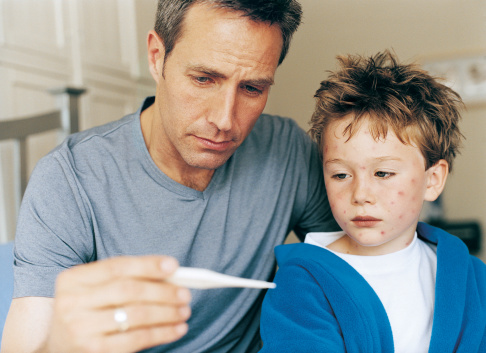Reye's Syndrome

About Reye's Syndrome
Why it is Problematic
Causes and Risk Factors
Symptoms
Diagnosis
Treatment and Prevention
Incidence
About Reye's Syndrome
Reye's syndrome is a rare and serious condition causing swelling in the liver and brain. Reye's syndrome often affects children and teens who are recovering from a viral infection or who have a metabolic condition.
Why it is Problematic
Reye's syndrome is a dangerous condition. Blood sugar levels drop while ammonia and acidity levels rise. The liver develops fat deposits, and brain swelling can cause seizures, convulsions or a loss of consciousness. Without proper diagnosis and treatment, varying degrees of brain damage are possible. Reye's syndrome can become fatal within only a few days.
Causes and Risk Factors
The exact cause of Reye's syndrome is unknown. Certain factors can play a role, such as fatty acid oxidation disorder (FAOD), a group of inherited disorders in which the body is unable to break down fatty acid because an enzyme is missing or not working properly. Having an underlying fatty acid oxidation disorder is also a risk factor for Reye's syndrome.
Exposure to certain toxins such as paint thinner, insecticides, and herbicides may also trigger a reaction.
The over-the-counter pain reliever aspirin has been linked to Reye's syndrome. Exercise great caution when giving aspirin to children. Never give aspirin to children or teenagers recovering from chicken pox or the flu.
In some cases, viral illnesses can reveal metabolic disorders.
Symptoms
Symptoms usually appear 3-5 days after a viral infection, including the common cold, chickenpox, or the flu.
Symptoms in children under 2 are:
- Diarrhea
- Rapid breathing
Symptoms in children age 2 and older are:
- Persistent or continuous vomiting
- Unusual tiredness or lethargy
- Aggressive, irritable or irrational behavior
- Confusion, hallucinations, disorientation
- Seizures
- Decreased consciousness
Diagnosis
There are no specific tests for Reye's syndrome. Testing usually begins with blood and urine tests followed by a fatty acid oxidation screening or testing for other metabolic disorders.
Sometimes more invasive tests are required to diagnose liver or neurological problems. A spinal tap is sometimes used to rule out other diseases. A liver biopsy in conjunction with diagnostic imaging procedures such as a CT scan or MRI can assist in determining the extent of liver damage.
Treatment and Prevention
Reye's syndrome can often be treated in the doctor's office. In severe circumstances, treatment will be performed in the intensive care unit of a hospital.
- Medical professionals will monitor blood pressure and other vital signs.Fluids such as glucose and an electrolyte solution may be administered through an IV.
- Fluids such as glucose and an electrolyte solution may be administered through an IV.
- Diuretics—medication to decrease pressure inside the skull (intracranial pressure) through increased urine production—may be prescribed.
- Anti-seizure medication may be prescribed.
- Anti-bleeding medication may be prescribed if bleeding related to liver problems occurs.
- Vitamin K treatment may be necessary depending on plasma and platelet count.
- A breathing machine (medical ventilator) may be necessary in some patients.
Because aspirin has been linked to Reye's syndrome, it is imperative that extreme caution be used when giving aspirin to children and teenagers. Always check labels for aspirin before giving medication or herbal remedies to children and teens. Aspirin can be found in many unexpected over- the-counter sources. Some other names for aspirin in product labeling are:
- Acetylsalicylic acid
- Salicylic acid
- Acetylsalicylate
- Salicylate
There are many other names for ingredients including aspirin. When inspecting a product, it may be helpful to look for ingredients containing the word "salicylate" or a derivative. When in doubt about whether a product contains aspirin or not, ask a pharmacist.
If your child has a chronic illness requiring aspirin intake, be sure that he or she is up to date on all vaccinations.
Incidence
The incidence of Reye's syndrome has decreased dramatically since the announcement of its tie to aspirin in 1980. It is estimated that only 2 cases are reported each year.
- About
- Directory
- Support
- Contact
Copyright © 2026 · All Rights Reserved · LiverDirectory.com
America’s Most Comprehensive Liver Health Network
Connecting Patients with Doctors, Support Groups, and Pharmacies Nationwide